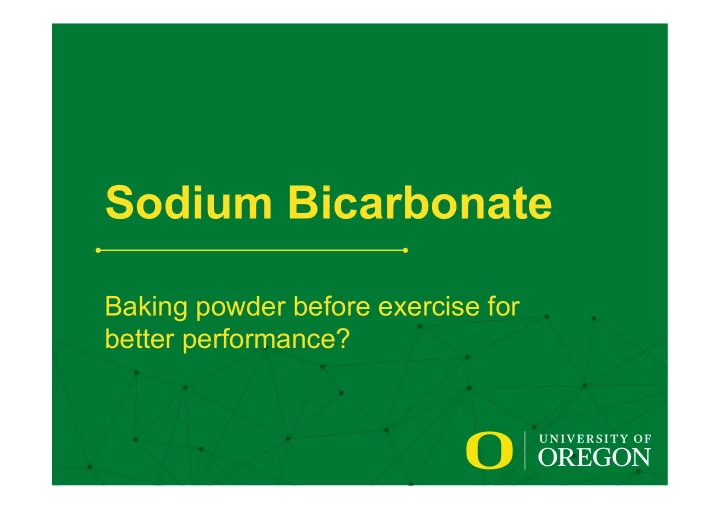

Sodium Bicarbonate Baking powder before exercise for better performance?
Anaerobic Glycolysis High intensity exercise of >10-sec is primarily fueled by anaerobic glycolysis & phosphocreatine 47% of the energy during sprints of 10 – 30-sec anaerobic glycolysis Aerobic metabolism increases proportionally to the amount of sprints completed (34% sprint 1 and 49% sprint 2 in 20-sec sprints)
How is that relevant? � Fueling Exercise � Fatigue � High intensity exercise is � Hydrogen ions may inhibit reliant upon carbohydrate calcium release from sarcoplasmic reticulum � Phosphocreatine plays an important role in very short � Hydrogen ions may inhibit rate duratation events limiting enzymes of glycolysis � Reduction in pH and acidosis may increase exercise-induced fatigue
Sodium Bicarbonate The alkalotic state induced by sodium bicarbonate ingestion is thought to: - Increase pH and blood bicarbonate - Increase muscle buffer capacity - Improve high-intensity exercise performance - May increase endurance training adaptations (via PGC-1a)
Sodium Bicarbonate Sports that may benefit from sodium bicarbonate ingestion include: - Single high-intensity events of 45-seconds to 8- minutes - Intermittent sports reliant upon repeated sprints - Endurance events with a sprint finish The loading protocol will differ with each of these sports
Loading Protocols Acute Loading: - 0.3 g/kg bw sodium bicarbonate - 60 – 120 mins pre-exercise - Capsule form over 20 – 30 mins - Combined with meal/snack providing 1.5 – 2.0 g/kg bw CHO and 7 ml/kg bw fluid Increase pH and bicarbonate in 60 – 120 mins Potential GI issues and impractical Strongest evidence
Loading Protocols Serial Loading: - 2 – 4 days pre-exercise - 0.5 g/kg bw sodium bicarbonate - Capsule form split evenly across 3 – 4 dosages - Combined with meal/snack and fluids Elevates pH and buffer capacity for 24 – 48-hours Reduces GI issues and more practical Moderate evidence
Loading Protocols Chronic Loading: - 3 days/week for up to 8-weeks to support high-intensity training (do more work) - 0.4 g/kg bw sodium bicarbonate - Capsule form over 3 – 4 even dosages - Combined with meal/snack and fluid Pre-season camp to allow more high-intensity work and greater adaptations Potentially greater aerobic adaptations via increased PGC-1a Low evidence
Side Effects Potential for severe GI distress (nausea, vomiting, stomach cramps, diarrhea) Weight gain via fluid retention (large dosage of sodium) May result in pH outside the acceptable range
Management Absolutely must trial this in training (minimum 3 times) prior to introducing it in competition Capsules need to be produced (cap-m-quick and gelatin capsules) Pre-exercise meal needs to be calculated to align with current evidence and consumed with acute dosage
Summary Simple message to athletes: Sodium bicarbonate (baking powder) is a buffer and can improve high-intensity performance. Removing lactate and hydrogen ions from the cell to reduce acidity, allowing you to do more work. You can take it immediately before exercise or in the days leading up to exercise.
Application Single high-intensity events: - Track & field: 200 m, 400 m, 800 m and 1500 m Intermittent sport: - Basketball, soccer, lacrosse, football Sprint finish: - Track & field or X Country: long distance Consult with athlete and coach to highlight individuals that may benefit
Questions
Recommend
More recommend